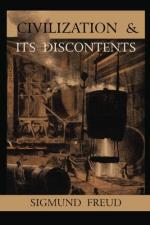
|
| Name: _________________________ | Period: ___________________ |
This test consists of 15 multiple choice questions and 5 short answer questions.
Multiple Choice Questions
1. What feeling does Freud say is associated with the negation of aggression?
(a) Guilt.
(b) Shame.
(c) Envy.
(d) Lust.
2. What question does Freud say this teaching omits?
(a) The question of sexual desire.
(b) The question of the other’s worth.
(c) The question of intellectual attraction.
(d) The question of the heart's capacity.
3. How does Freud distinguish between the individual trend in civilization, and the cultural trend in civilization?
(a) Egotistic and altruistic.
(b) Dependent and independent.
(c) The Eros instinct and the death principle.
(d) Immoral and ethical.
4. What comparison does Freud make between the Devil and Jews?
(a) He says that Jews are the Devil incarnate.
(b) He says that they are both scapegoats.
(c) He says that they are both illusory concepts.
(d) He says that they are both enemies of Christians.
5. Who does Freud say takes the place of mother and father, as people grow up?
(a) Once's instincts.
(b) Society as a whole.
(c) One's offspring.
(d) The leaders of society.
6. How does Freud describe the libido’s disinclination to relinquish an old position for a new one?
(a) As regression.
(b) As inertia.
(c) As synthesis.
(d) As conservatism.
7. What does Freud say a man feels as a result of a cultural super-ego?
(a) Anxiety of conscious.
(b) Desire for escape from society.
(c) Nostalgia for regressive states.
(d) Remorse for unfulfilled potential.
8. What is love’s chief function, according to Freud?
(a) To hold society together.
(b) To renew men’s desire to live.
(c) To perpetuate the species.
(d) To resolve differences.
9. What is Freud’s first reaction to the notion that one should “love they neighbor as thyself”?
(a) He is comforted by it.
(b) He finds it unnatural.
(c) He is blind to it, it is so familiar.
(d) He is appalled by it.
10. What does Freud say about restrictions on sexual life if society is to be held together?
(a) They are necessary.
(b) They inhibit social cohesion.
(c) They can be replaced by other restrictions.
(d) They are not always necessary.
11. How does Freud say society endeavors to restrict violence?
(a) Be exiling violent people.
(b) By authorizing violence for certain uses.
(c) By claiming violence as its sole right.
(d) By forcing self-monitoring in the people.
12. What does Freud say men should make humble obeisance” to?
(a) The divine grace of God.
(b) The power of the Devil, or man’s innate destructiveness.
(c) The high-minded nature of man.
(d) The power of the state to regulate human affairs.
13. How does Freud describe wickedness?
(a) As that which should not be done.
(b) As that which is forbidden.
(c) As that which others have been punished for.
(d) As that which has been punished in the past.
14. What does Freud say he would have to do to fulfill this motto?
(a) Make sacrifices.
(b) Love all humanity.
(c) Find the right partner.
(d) Remain celibate.
15. Freud says that it is hard to see Eros and the death instinct unmixed together. Where does he say he might expect to see them?
(a) Extreme cases.
(b) Infants.
(c) Neurotics.
(d) Religious types.
Short Answer Questions
1. What do Freud’s patients not believe, in his account?
2. What does Freud say the libidinal elements of a desire turn into when they are repressed?
3. What is the ego instinct antithetical to, according to Freud?
4. What does Freud say is the most pressing problem in the evolution of culture?
5. Where does Freud say the ability to distinguish between good and evil comes from?
|
This section contains 595 words (approx. 2 pages at 300 words per page) |

|




